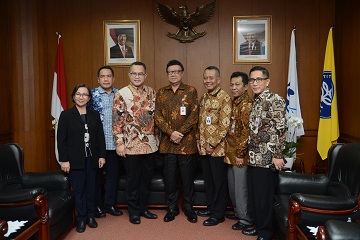Minister of Home Affairs Invited IPB to Accelerate the Development of Border Area

The Minister of Home Affairs of Republic of Indonesia as well as the Head of the National Border Management Agency (BNPP), Tjahjo Kumolo, conveyed that the border management had a very strategic and important value. “This is because it is directly related to the enforcement of the state sovereignty, the enforcement of the state defense and security, the resource utilization and the equitable development. Besides, our responsibility is in building the competitiveness of the border communities to balance the socio-economic activities of the neighboring communities,” explained Tjahjo in the Public Lecture related to the development of the border area in an effort to improve the people’s welfare and to strengthen the resilience of the nation, Wednesday (2/4) in Campus of IPB Dramaga.
According to Tjahjo, the management of the state borders contained two dimensions, namely "Pengelolaan Batas Wilayah Negara / State Boundary Management" (border line) and "Pembangunan Kawasan Perbatasan / Development of Border Area" (border area). "Together, both aspects determine the face of our country in dealing with the neighboring countries," said Tjahjo Kumolo.
In the framework of the food sovereignty, the government built the integrated agriculture through the new paddy field in West Kalimantan with an area of 1,782 hectares with the rice production target of 3,809 tons. In Papua, it opened a land area of 2,841 hectares with the rice production of 8,523 tons. Here was also the integrated agricultural development through the development of the integrated organic farming with the cattle fattening in Belu District, East Nusa Tenggara, the area of 500 hectares.
"Through a coordinated and integrated state border management mechanism, the weaknesses and limitations that exist all along, can be improved, so that the management of the state borders and the construction of the border area can be realized in step by step," continued Tjahjo.
The Rector of IPB, Dr. Arif Satria, in his speech, reported how the role of IPB in building the border areas. “IPB has a number of major programs. The programs we packed are in IPB 4.0. IPB Smart, IPB Green, IPB Lead, IPB Biz, IPB Excel, and IPB Share. IPB Share aims to utilize the resources to provide the solutions to the industrial community. Of course, the government needs the role of universities in guarding the process of the nation transformation. However, we need to collaborate with various parties, including with BNPP," explained the Rector.
Besides known as the Innovation Campus, where 39.33 percent of 1045 most prospective innovations found by the researchers of IPB, IPB was also known as the campus that many did the community service activities.
“Related to the dedication to the community of IPB lowers the students to the Real Work Lecture / Kuliah Kerja Nyata in the border area. The Real Work Lecture / Kuliah Kerja Nyata can increase the sensitivity of the students’ softskills in the framework of the self-development and the community development. Related to the research and policy advocacy in the border areas, IPB has made the study among others themed: ‘Kajian Manfaat Kerjasama Internasional dalam Mendorong Pembangunan di Wilayah Perbatasan-Studi / Review of the Benefits of International Cooperation in Promoting Development in Boundary-Study Area’ , ‘Penyusunan Master Plan Pengembangan Kawasan Kelautan dan Perikanan / Preparation of Master Plan for Development of Marine and Fishery Areas’, ‘Program Pengembangan Kelembagaan Pengelolaan Infrastruktur Pertanian dan Pedesaan di Kawasan Perbatasan / Institutional Development Program of Agricultural and Rural Infrastructure Management in Border Areas’, and ‘Penyusunan Dokumen Daerah Perbatasan / Preparation of Border Area Documents’, “ explained the Rector of IPB.
On that occasion, the Rector of IPB, Dr. Arif Satria, and the Secretary of the National Border Management Agency (BNPP), Widodo Sigit Pudjianto, signed the Memorandum of Understanding. The principles of the memorandum of understanding were mutually supportive and beneficial for the development in the border areas in line with Nawacita President Joko Widodo, especially related to the aspects of food, energy, natural resources, biology, and health. (dh/ris)



